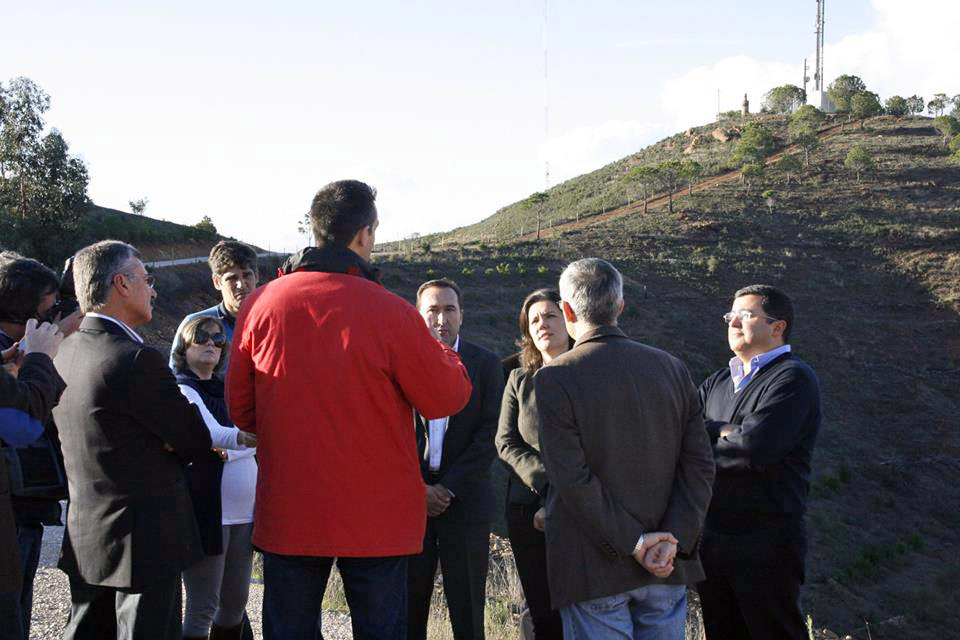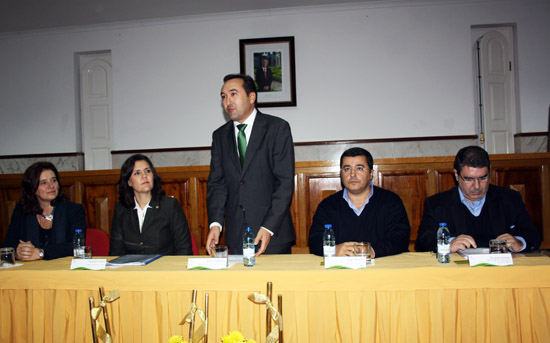 Serra do Caldeirão is recovering, after the 2012 fires in Tavira and São Brás de Alportel, and there are already results to see, on the ground.
Serra do Caldeirão is recovering, after the 2012 fires in Tavira and São Brás de Alportel, and there are already results to see, on the ground.
More than a thousand hectares of new forest production zone, with «more than 300 thousand cork oaks and a few thousand arbutus trees», and the creation of two more Forest Intervention Areas (ZIF), which add to those that already existed in this territory, are the "positive" points of the work carried out by local authorities and private individuals, which the Minister of Agriculture Assunção Cristas insisted on seeing, on-site visit, last Monday.
Assunção Cristas was in Tavira and São Brás de Alportel, to visit some places where reforestation is already underway, after a first phase of stabilization measures, and praised the work that has been done since 2012. The day ended with a session, in São Brás de Alportel, with local entities.
After having visited the areas affected by this great fire in 2012, which destroyed more than 26 thousand hectares (approximately 5 of which in forest production area), the minister noted that, «at the time, there were already two ZIF and now there are two more to be built and that, at the moment, there are already XNUMX hectares duly worked, with new plantation of cork oaks and strawberry trees”, in addition to seeing that “there is a constant and consistent effort on the part of these entities” to recover the Serra do Caldeirão.
"Two years later,(…) the period considered critical to assess the territory and start other, more advanced afforestation actions, it was time to see what had already been done," explained Assunção Cristas, on the sidelines. visit.
Jorge Botelho: “There is a huge expanse of land that previously had nothing, which is now undergoing intervention. This could prove to be an enormous wealth for the Serra in the long term”
This was the second visit that the official made to this area. «Two years ago, right after the fire, I made a very discreet visit to see on-site visit the devastating consequences of fires. And right then, I met with some associations of forest producers and challenged them to look at that misfortune as an opportunity, to then repopulate the territory, looking at the species in question and the ease of integration in the primary network of protection of the forest against fire”, he illustrated.
The challenge was accepted, as confirmed by the mayor of Tavira Jorge Botelho, the municipality in which the largest area burned. The data advanced by the minister, explained the mayor to the Sul Informação, are related to Tavira, where «the City Council and the private sector launched themselves on the ground, in a logic of redoing, with recourse to community funds».
“There is still a lot to do. But, after the stabilization measures that were taken, quickly, it is already starting to see that the economic dynamic is growing, in the Serra, due to the intervention of the ZIF», assured Jorge Botelho.
“There is a huge expanse of land that previously had nothing that is now being intervened. This could prove to be an enormous wealth for the Serra, in the long term”, he believes.
A dynamism that is closely linked "to private individuals, namely young entrepreneurs, who have shown interest in organizing themselves in ZIF". "It is important that good projects are carried out, so that the local economy can be boosted and that wealth and jobs are created in this territory," added Jorge Botelho. In this field, the union between different producers is crucial, as this is the only way they will have access to Community Funds.
 The mayor of São Brás de Alportel Vítor Guerreiro, in turn, recalled, in the session that this council hosted, in which Assunção Cristas participated, the difficulties faced by those who want to invest in the agricultural area in that council.
The mayor of São Brás de Alportel Vítor Guerreiro, in turn, recalled, in the session that this council hosted, in which Assunção Cristas participated, the difficulties faced by those who want to invest in the agricultural area in that council.
The mayor speaks of an inadequacy “between the measures presented, and their alleged proponents, and the socio-demographic and economic reality of the interior of the São Brasense municipality, which adds to the difficulty in obtaining financing to invest in the sector.
«More productivity and solutions suited to the local reality are essential for the socioeconomic development of São Brás de Alportel and also of the Algarve, with a special focus on the agricultural industry, taking into account the specificity of this territory», defended Vítor Guerreiro.
Thus, he called on the Government to promote "greater streamlining of procedures, reduction of bureaucratic obstacles, decentralization of decision-making power to the deconcentrated directions in the region and guarantees of greater autonomy of local power in the management of its territory."


















Comments